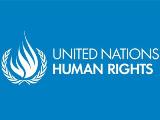“Human Rights Must Be at the Centre of the UN Vision for the Rule of Law”
The Coordination Committee of the Special Procedures of the Human Rights Council publising an open letter concerning the forthcoming high-level meeting on the rule of law at the national and international levels (UN General Assembly, 24 September 2012) has called for adopting a victim-centred approach in order to guarantee full implementation of the right to an effective remedy for human rights violations. It further says that ‘access to justice should be ensured for all, including the most vulnerable and marginalized and the independence of the institutions which can monitor and redress human rights violations should be guaranteed.’
The letter in full:
“The Coordination Committee of the Special Procedures of the Human Rights Council calls on all stakeholders, in particular Member States, to seize the opportunity of the high-level meeting on the rule of law at the national and international levels, which will convene at the General Assembly on 24 September 2012 to underscore the inherent link between the rule of law and human rights.
In a period when people have demanded more accountability, democracy and respect for all human rights leading to significant changes in many parts of the world, human rights must be at the core of the United Nations approach to the rule of law. The rule of law is of little value without the promotion and protection of human rights, which are the normative foundation of the United Nations and its work. At the same time, only a society based on the rule of law can guarantee enjoyment of all human rights by all people without discrimination.
The World Summit Outcome reaffirmed the fact that human rights, the rule of law and democracy are interlinked and mutually reinforcing and part of the universal and indivisible core values and principles of the United Nations. The high-level meeting provides a unique opportunity to translate these words into reality and for States to make concrete commitments to advancing the rule of law consistent with their existing obligations under international law. The Committee encourages Member States to strengthen the human rights elements of the outcome document by highlighting the interdependence of the rule of law and all human rights: civil, cultural, economic, political and social.
For more than 60 years, the United Nations has crafted the international human rights system, developing norms and standards, and creating various mechanisms to foster their implementation and monitoring. This has strengthened the rule of law. The Human Rights Council and United Nations human rights mechanisms, including special procedures, have made key contributions to the elaboration of the concept of the rule of law.
Special procedures undertake country visits and report on these; they prepare and present thematic reports to the General Assembly and the Human Rights Council; and transmit communications on individual cases to States. Their mandates cover a wide range of issues which range from the eradication of extreme poverty, equal access to justice, respect for the independence of the judiciary and due process of law, the fight against discrimination, to transitional justice. Through their devoted work as independent experts, special procedures raise awareness of existing norms and standards, provide guidance to States on their implementation, and demand accountability for human rights violations. They may recommend the elaboration of new norms and standards. Their studies have also contributed to the development of basic principles, for example, in the fields of the right to truth, reparations, witness protection, transitional justice and impunity. In this way, special procedures have contributed to the creation of rule of law societies.
We encourage Member States to draw on the work of special procedures as they develop the United Nations vision for the rule of law, and call on them to refer to the work of human rights mechanisms and their contribution to the rule of law in the outcome document. We ask Member States to support the United Nations human rights mechanisms and strengthen their commitment to cooperate with them to strengthen the rule of law and guarantee accountability for human rights violations at the international and national levels. The recommendations of these mechanisms should be carefully considered and implemented as a way to combat impunity.
We call on Member States to adopt a victim-centred approach in order to guarantee full implementation of the right to an effective remedy for human rights violations. Access to justice should be ensured for all, including the most vulnerable and marginalized and the independence of the institutions which can monitor and redress human rights violations should be guaranteed. As the Secretary-General has made clear, Member States should consider ways of implementing their obligations to grant effective remedies and adequate reparations to victims of international crimes and other violations of human rights. Here groups most affected by these crimes and those who have traditionally been excluded from or marginalized in reparations programmes, such as victims of sexual and gender-based violence, require special consideration. These measures are essential to ensure that the public trust justice and related institution which strengthens and entrenches the rule of law.
We encourage Member States to implement fully the human rights principle of participation, in particular from civil society, including in all rule of law efforts and any future related process.
We concur with the Secretary-General’s proposal that the high-level meeting should not be an end in itself, but rather the beginning of a process in which clear rule of law goals, fully consistent with human rights, are agreed. The United Nations human rights system and the tools it provides should be an integral part of these goals. In particular, recommendations by United Nations human rights mechanisms should be mainstreamed in this exercise so that a coordinated and coherent vision of the rule of law that fully integrates human rights can be agreed.
Special procedures stand ready to contribute further to this exercise and share their expertise in any follow-up process that will be agreed upon at the high-level meeting.”
